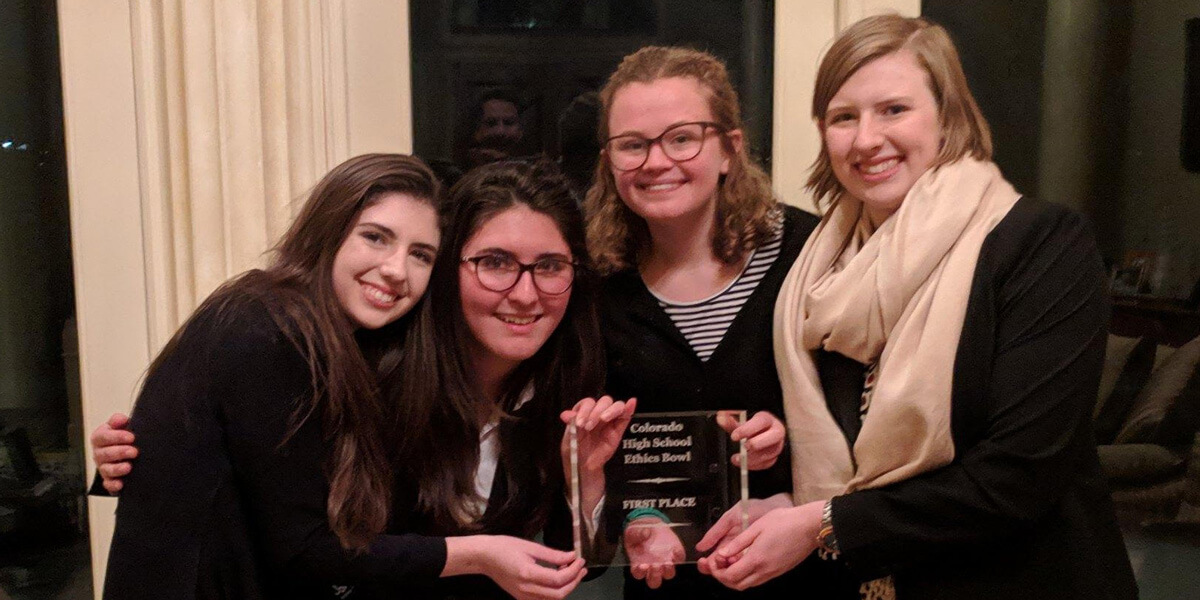When four Colorado Academy Juniors decided to tackle the National Ethics Bowl competition, their efforts seemed like a longshot—even to them. After all, Colorado Academy had never sent a team to any Ethics Bowl competition; they had no precedent to follow.
So the fact that Jasmine Bilir, Anne Freeman, Kayleigh Milligan, and Anna Fucarino triumphed at their first two rounds of preliminary competition and are headed to the National Ethics Bowl Finals at the University of North Carolina (UNC) at Chapel Hill has left them—as Bilir puts it—“in a state of shock and awe.”
Looking at the big questions
The trip to the superbowl of ethics grew out of the Philosophy Club, which Bilir started last year to give CA students the opportunity to discuss “big questions and look at all sides of an issue.”
This year, in an effort to “take things up a notch,” Bilir started looking online for competitions that involved ethical discussions. Most high school teams start preparing for local and regional Ethics Bowl competitions in September. CA students started prepping in December.
Even with a late start and no competitive experience, the team triumphed at the Colorado High School Ethics Bowl tournament, hosted by CU Boulder’s Center for Values and Social Policy on Feb. 2, 2019. Competing against eight Colorado high school teams, the CA students won first place, impressing judges from CU Boulder faculty. One of the topics they tackled in the competition was a discussion of “de-extinction,” also known as “resurrection biology”—creating an organism that is either a member of, or resembles, an extinct species. The question they discussed was, “To what degree, if any, should the United States participate in de-extinction efforts?”
Their next round of competition was virtual. On a Saturday morning in the Smith Center on CA’s campus, they logged on to Google Hangouts and faced the very confident and composed state winning team from Utah. The question they discussed was, “Should the right to self-defense play a role in gun legislation, which could increase or limit access to guns?”
What is an Ethics Bowl?
What is an ethics bowl competition you might ask? Think debate, but with more team collaboration and a greater focus on critical thinking and speaking about ethical issues. In each round of competition, teams take turns analyzing cases about complex ethical dilemmas and responding to questions and comments from the other team and from a panel of judges.
An ethics bowl differs from a debate competition in that students are not assigned opposing views; rather, they defend whichever position they think is correct, provide each other with constructive criticism, and win by demonstrating that they have thought rigorously and systematically about the cases and engaged respectfully and supportively with all participants.
The National Ethics Bowl
The CA team will head to the national competition in early April to face student teams from every region of the U.S. and discuss ethical dilemmas ranging from heavy-hitting political issues to personal family difficulties. Bilir doesn’t seem to be concerned about the end results, though. “It’s just a lovely experience,” she says. “It works because it’s team first—that’s what has brought us this far. We are just friends who enjoy asking big questions outside of class.”
But that relaxed approach doesn’t mean CA isn’t ready to compete. Bilir is already looking ahead to next year when “we are more experienced, and we can bring multiple teams!”
